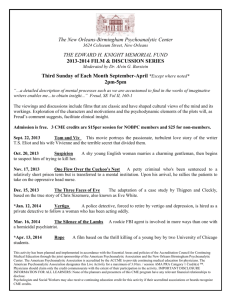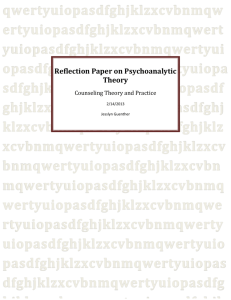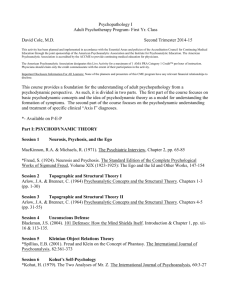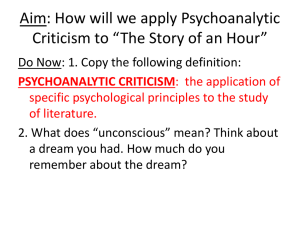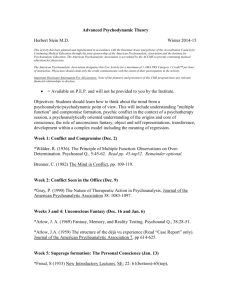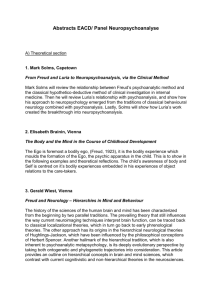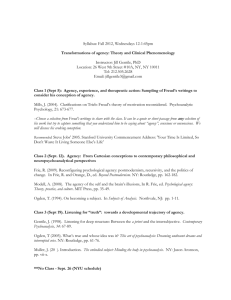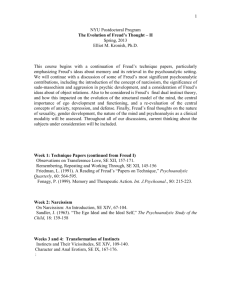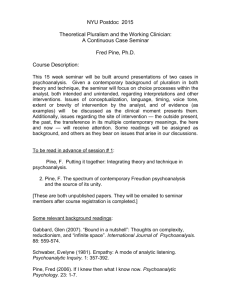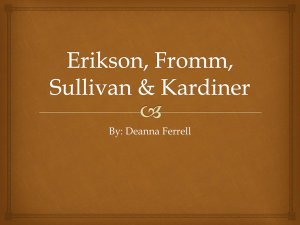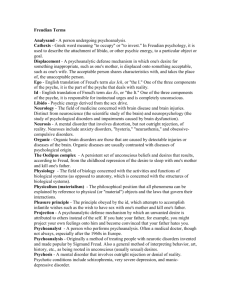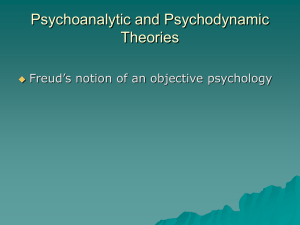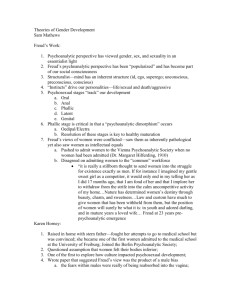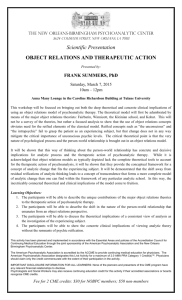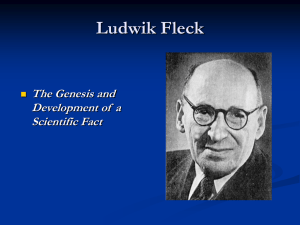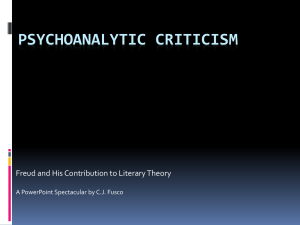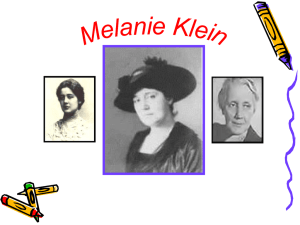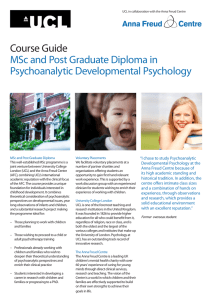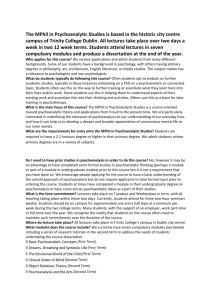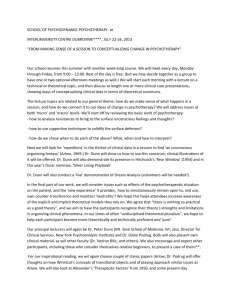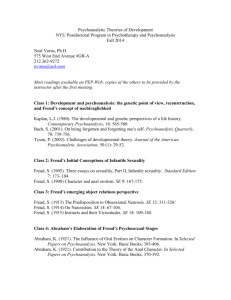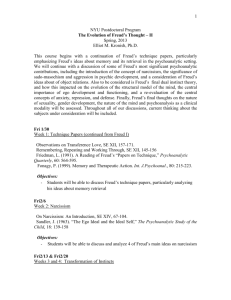Reflection paper: Psychoanalytic theory & therapy Reflection paper
advertisement
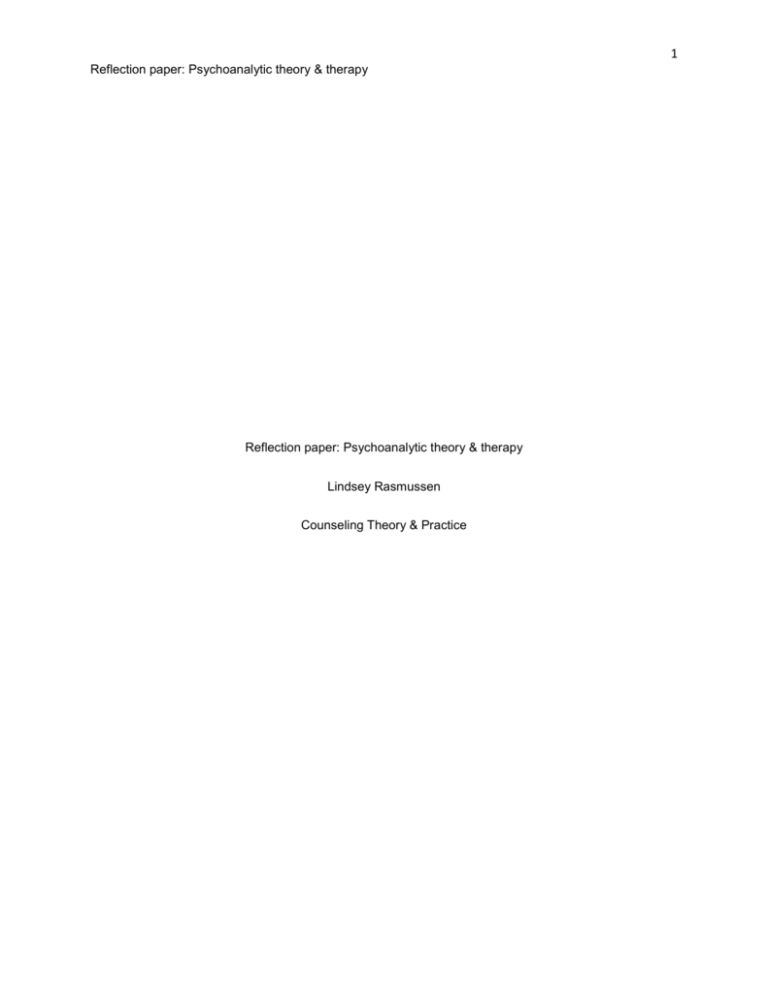
1 Reflection paper: Psychoanalytic theory & therapy Reflection paper: Psychoanalytic theory & therapy Lindsey Rasmussen Counseling Theory & Practice 2 Reflection paper: Psychoanalytic theory & therapy My initial interest in psychology was driven by my fascination with Freud, his theory of personality development, and his unique therapeutic approach. However, as I got further into my education, I would learn (albeit begrudgingly) that psychoanalytic theory – although providing the foundation upon which subsequent theories of personality were built and developed – couldn’t possibly explain everything. So, I began to drift away from this school of thought and in fact, hadn’t given it much thought or consideration in quite some time. That was, however, until this particular lesson plan brought me full circle, so to speak, and back to where my interest in psychology began – psychoanalytic theory and therapy. Becoming reacquainted with this model of personality development and approach to psychotherapy was surprisingly exciting. I felt that same sense of inspiration and fascination as I had the first time I was introduced to it, only this time it was accompanied by an understanding that psychoanalysis is not a stagnant theory, but rather quite the opposite – a continually evolving field, first revised by Freud himself. Overall, I really appreciate the following aspects of psychoanalysis: (1) the importance of childhood experiences; (2) the concepts of fixation, regression, and defense mechanisms; and (3) the idea that our lives are the result of choices we make at each stage of development (based on Erikson’s psychosocial model of development). On the other hand, I do not agree with the over-emphasis Freud places on sexuality, the tendency for this theory to “blame” mothers for dysfunction, and the anonymous role the therapist must play to foster transference. In general, I believe that our pasts play an important role in our futures, for example the people we become and the problems we may experience later on in our relationships. However, it seems as though Freud placed too much emphasis on the past, sexual elements, and the role of mothers, while not giving enough attention to the role of cultural and societal influences on personality development, the importance of an engaged therapist, nor the role fathers play in the lives of children. Furthermore, I think the concepts of fixation, regression, and defense mechanisms are rather useful and supported by evidence, although again, just perhaps not to the extent that Freud first envisioned. Lastly, I believe that combining Freud’s psychosocial stages with Erikson’s psychosocial stages provides us with a more complete picture of the critical turning points each of us face at certain developmental stages. And, it’s our 3 Reflection paper: Psychoanalytic theory & therapy decisions that each of us make at these points that helps determine who we are – it’s not chance nor is it pre-determined by our childhood. Overall, I see Freudian theory as providing an excellent foundation upon which others have been built. Although Freud may have placed too much focus on certain elements, others, such as Erikson, were able to build upon and extend these ideas to explain development throughout the lifespan, while also including the importance of culture and social influences, which we now know have to be addressed to have a fuller understanding of the whole person. Additionally, I see the ideas of fixation, for example, as interesting ways to approach addiction. Although not the only way, it’s a unique approach to something we, at times, still struggle to adequately explain. This perspective is interesting, and perhaps with the right person, may provide answers that s/he may not have otherwise found. As a person and a professional, I am quite interested in the Neo-Freudian movement because in my opinion, we are profoundly affected by our interactions with others, and that many of our emotional conflicts and psychological symptoms can be traced back to these experiences. I am also interested in learning more about brief psychodynamic therapy (BPT), where problems are treated in the context of a person’s current situation and with consideration given to his/her earlier life experiences. I am curious as to how effective this therapy is, and if it could be useful in working with people struggling with addiction. Although it may not be the only way, it sounds like it could be helpful to incorporate some psychodynamic aspects in my future practice. Only time will tell, but I’m looking forward to learning more about various theories and therapies, their efficacy in treatment, and what it means (and feels like) to actually use them in practice. All in all, I continue to be fascinated by Freud’s psychoanalytic theory and therapy, although on the other hand, I see the problems that it inherently has (too much focus on past experiences and sexual elements) as well as the practical problems it entails (too time-consuming, not economical, based on upper- and middle-class values, etc.). So, my solution to this dilemma is to take more contemporary aspects of this theory and apply them in more of a psychodynamic-oriented kind of therapy. However, this is just the first of many different kinds of theories and therapies I will learn about and I don’t have to make a decision about my theoretical orientation anytime soon. If anything, I want to learn as much as I 4 Reflection paper: Psychoanalytic theory & therapy possibly can about the various psychological and therapeutic perspectives, build a repertoire of skills based on the best and most effective techniques out there, and then begin to try them out in practice to see what I work best with, and what is going to work best with the clientele I serve. I don’t necessary have any questions about this particular theory at this time, although I am wondering about what your opinion as an instructor and former counselor is, about this theoretical orientation. In other words, what theoretical orientation did you work from and did you utilize any elements of psychoanalytic theory and/or therapy? Why or why not? This then brings me to the final aspect of this reflection, implications for action. I am looking forward to discussing aspects of psychoanalysis and the more contemporary psychodynamic approach, with my peers and professionals in the field. I am really curious about how other people feel about the theoretical basis and practical techniques that accompany each and what their reasoning is. Furthermore, I would like to discuss with professional in the field, about what their theoretical and practical orientation is, what techniques they utilize, and how they arrived at these decisions. Because right now, that’s what I’m most concerned with, how am I going to know what’s right for me? I know that I gravitate towards certain aspects of psychoanalytic theory and its more contemporary applications in therapy…but how do I know this is what is going to work for me as a professional, and more importantly, for my clientele? I guess only time and experience will be able to provide me with the answers I am looking for. In conclusion, I feel rejuvenated and optimistic after my re-introduction to psychoanalysis and after learning more about its more contemporary applications, I believe that our pasts have a strong influence on the people we become, but I also know that there is much more to the story than this. Humans are complex beings and their problems and issues cannot be addressed with a “one size fits all” theory or therapy, Perhaps that’s what is so intimidating about being a professional counselor – every person is unique with regards to their past experiences, personal history, current situation, symptomatic expression, goals of therapy, and future aspirations. This could be another reason why there are so many different approaches – one will not work for everybody. That being said, I need to take what I feel is important from this particular theory, incorporate it into what should be an ever-expanding knowledge base, apply it when appropriate, and make revisions whenever necessary – to ideas and techniques..
